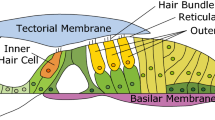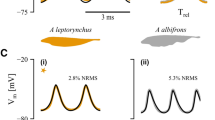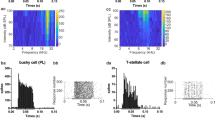Abstract
IN an earlier experiment1, the tip of a needle was pressed against the cochlear partition of a lightly anæsthetized guinea pig, and the microphonics produced by the displacement of the cochlear partition were observed. The mechanical work necessary for a certain displacement of the cochlear partition could be measured and compared with the electric energy produced by the microphonics for this displacement. This comparison showed that the electric output in the vestibular canal of the cochlea was larger than the mechanical energy used up in the displacement of the cochlear partition. This finding suggested that the cochlear partition contains a pool (source) of electrical energy.
This is a preview of subscription content, access via your institution
Access options
Subscribe to this journal
Receive 51 print issues and online access
$199.00 per year
only $3.90 per issue
Buy this article
- Purchase on Springer Link
- Instant access to full article PDF
Prices may be subject to local taxes which are calculated during checkout
Similar content being viewed by others
References
v. Békésy, G., J. Acoust. Soc. Amer., 23, 576 (1951).
Author information
Authors and Affiliations
Rights and permissions
About this article
Cite this article
BÉKÉSY, G. Resting Potentials Inside the Cochlear Partition of the Guinea Pig. Nature 169, 241–242 (1952). https://doi.org/10.1038/169241a0
Issue Date:
DOI: https://doi.org/10.1038/169241a0
This article is cited by
-
Development of cochlear spiral ligament fibrocytes of the common marmoset, a nonhuman model animal
Scientific Reports (2023)
-
Development of the stria vascularis in the common marmoset, a primate model
Scientific Reports (2022)
-
Characterisation of N-glycans in the epithelial-like tissue of the rat cochlea
Scientific Reports (2019)
-
Integrative and theoretical research on the architecture of a biological system and its disorder
The Journal of Physiological Sciences (2019)
-
Computer modeling defines the system driving a constant current crucial for homeostasis in the mammalian cochlea by integrating unique ion transports
npj Systems Biology and Applications (2017)
Comments
By submitting a comment you agree to abide by our Terms and Community Guidelines. If you find something abusive or that does not comply with our terms or guidelines please flag it as inappropriate.



